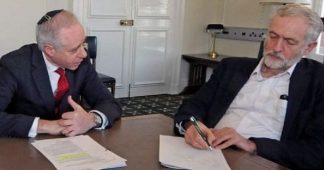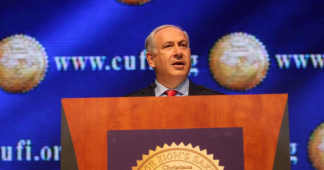By Jonathan Cook
6 September 2018
Back in the 1950s, the US intelligence community coined a term: “blowback”. It referred to the unintended consequences of a covert operation that ended up damaging one’s own cause.
There are mounting indications that the intensifying campaign by the Israel lobby in the UK against Jeremy Corbyn, the leader of the parliamentary opposition, is starting to have precisely such self-harming repercussions.
A campaign of smears
In the three years since he was elected to lead the Labour party, Corbyn has faced non-stop accusations that his party has an endemic “anti-Semitism problem“, despite all evidence to the contrary. Of late, Corbyn himself has become the chief target of such allegations.
Last week the Daily Mail led a media mauling of Corbyn over disparaging comments he made in 2013 about a small group of pro-Israel zealots who had come to disrupt a Palestinian solidarity meeting. His reference to them as “Zionists”, it was claimed, served as code for “Jews” and was therefore anti-Semitic.
Mounting evidence in both the UK and the US, where there has been a similar escalation of attacks on pro-Palestinian activists, often related to the international boycott movement (BDS), suggests that the Israeli government is taking a significant, if covert, role in coordinating and directing such efforts to sully the reputation of prominent critics.
Corbyn’s supporters have argued instead that he is being subjected to a campaign of smears to oust him from the leadership because of his very public championing over many decades of the Palestinian cause.
Israel lobbyists
Al-Jazeera has produced two separate undercover documentary series on Israel lobbyists’ efforts in the UK and US to interfere in each country’s politics – probably in violation of local laws. Only the UK series has been aired so far.
It showed an Israeli embassy official, Shai Masot, both plotting to “take down” a Conservative government minister seen as too sympathetic to the Palestinian cause and helping to create an anti-Corbyn front organisation in the Labour party.
Masot worked closely with two key pro-Israel groups in Labour, the Jewish Labour Movement and Labour Friends of Israel. The latter includes some 80 Labour MPs.
Under apparent pressure from the Israel lobby in the US, the series on the US lobby was suppressed.
This week Alain Gresh, the former editor of Le Monde diplomatique, published significant quotes from that censored documentary after viewing it secretly in Dubai. The US lobby’s aims and practices, as reported by Gresh, closely echo what has happened in the UK to Corbyn, as he has faced relentless allegations of anti-Semitism.
The US documentary reportedly shows that Israel’s strategic affairs ministry has taken a leading role in directing the US lobby’s efforts. According to Gresh, senior members of the lobby are caught on camera admitting that they have built up a network of spies to gather information on prominent critics of Israel.
In Gresh’s transcripted excerpts, Jacob Baime, executive director of the Israel on Campus Coalition, a group of organisations fighting BDS, states: “When I got here a few years ago, the budget was $3,000. Today it’s like a million and a half [dollars], or more. … It’s a massive budget.”
“It’s psychological warfare,” he adds, noting how the smears damage the targeted groups: “They either shut down, or they spend time investigating [the accusations against them] instead of attacking Israel. It’s extremely effective.”
David Hazony, a senior member of another lobby group, The Israel Project, explains that a pressing aim is to curb political speech critical of Israel: “What’s a bigger problem is the Democratic Party, the Bernie Sanders people, bringing all the anti-Israel people into the Democratic Party. Then being pro-Israel becomes less a bipartisan issue, and then every time the White House changes, the policies towards Israel change. That becomes a dangerous thing for Israel.”
No discussion
These reported quotes confirm much of what was already suspected. More than a decade ago scholars John Mearsheimer and Steven Walt wrote a book examining the composition and role of the powerful pro-Israel lobby in the US.
But until the broadcasting of the Al-Jazeera documentary last year no comparable effort had been made to shine a light on the situation in the UK. In fact, there was almost no discussion or even acknowledgment of the role of an Israel lobby in British public and political life.
That is changing rapidly. Through its constant attacks on Corbyn, British activists are looking less like disparate individuals sympathetic to Israel and more recognisably like a US-style lobby – highly organised, on-message and all too ready to throw their weight around.
The lobby was always there, of course. And, as in the US, it embraces a much wider body of support than right-wing Jewish leadership organisations like the Board of Deputies and the Jewish Leadership Council, or hardline lobbyists such as the Community Security Trust and BICOM.
The earliest Zionists
That should not surprise us. The earliest Zionists were not Jews but fundamentalist Christians. In the US, the largest group of Zionists by far are Christian evangelicals who believe that the return of Jews to the Promised Land is the key to unlocking the second coming of the Messiah and an apocalyptic end-times. Though embraced by Israel, many of these Christian fundamentalists hold anti-Semitic views.
In Britain, there is an unacknowledged legacy of anti-Semitic Christian support for Zionism. Lord Balfour, a devout Christian who regularly voiced bigotry towards Jews, was also the man who committed the British government in 1917 to create a home for Jews in Palestine. That set in motion today’s conflict between Israel and the native Palestinian population.
In addition, many British gentiles, like other Europeans, live with understandable guilt about the Holocaust.
One of the largest and most effective groups in Corbyn’s parliamentary party is Labour Friends of Israel (LFI), most of whose members are not Jewish. LFI takes some of the party’s most senior politicians on all-expenses-paid trips to Israel to wine and dine them as they are subjected to Israeli propaganda.
Dozens of Labour MPs have remained loyal to LFI even as the organisation has repeatedly refused to criticise Israel over undeniable war crimes.
When Israeli snipers executed dozens of unarmed demonstrators in Gaza in May, the LFI took to Twitter to blame Hamas for the deaths, not Israel. After facing a massive backlash, the LFI simply deleted the tweet.
A double whamy
Historically the Israel lobby could remain relatively low-profile in the UK because it faced few challenges. Its role was chiefly to enforce a political orthodoxy about Israel in line with Britain’s role as Washington’s foreign policy junior partner. No British leader looked likely to step far from the Washington consensus.
Until Corbyn.
The Israel lobby in the UK now faces a double whammy.
First, since Donald Trump entered the White House, Israeli Prime Minister Benjamin Netanyahu has dropped any pretence that Israel is willing to concede a Palestinian state, whatever the Palestinians do. Instead, Israel has isolated the Palestinian leadership diplomatically while seeking to terrorise the Palestinian population into absolute submission.
That was all too clear over the summer when those Israeli snipers picked off demonstrators each week in Gaza. As a result, the Israel lobby stands more exposed than ever. It can no longer buy time for Israeli expansionism by credibly claiming, as it once did, that Israel seeks peace.
Second, Israel’s partisans in the UK were caught off-guard by the unexpected rise of Corbyn to a place that puts him in sight of being the next prime minister. The use of social media by his supporters, meanwhile, has provided a counter-weight to the vilification campaign being amplified by the British media.
The media have been only too willing to assist in the smearing of the Labour leader because they have their own separate interests in seeing Corbyn gone. He is a threat to the corporate business interests they represent.
But not only has the messenger – the Israel lobby – now come under proper scrutiny for the first time, so has its message.
English Irony
The success of the lobby had depended not only on it remaining largely out of view. It also expected to shore up a largely pro-Israel environment without drawing attention to what was being advocated, beyond unquestioned soundbites. In doing so, it was able to entirely ignore those who had paid the price for Israel’s diplomatic impunity – the Palestinians.
The campaign against Corbyn has not only forced the lobby to come out into the open, but the backlash to its campaign has forced the lobby to articulate for the first time what exactly it believes and what is at stake.
The latest furore over Corbyn concerns a Youtube video of him speaking at a pro-Palestinian meeting in 2013, two years before he became Labour leader. He has been widely denounced in the media for making disparaging remarks about a small group of hardline pro-Israel partisans well-known for disrupting such meetings.
He referred to them as “Zionists” and suggested that the reaction of this particular hardline group to a speech by the Palestinian ambassador had betrayed their lack of appreciation of “English irony”.
"I gave Corbyn the benefit of the doubt on antisemitism. I can’t any more" – powerful piece from @shattenstone who, like me, has defended Corbyn up until now but, like me, struggles to defend his 'Zionist' remarks that have emerged from 2013.https://t.co/vHms7zKlcS
— Mehdi Hasan (@mehdirhasan) August 24, 2018
Israel’s lobby, echoed by many liberal journalists, has suggested that Corbyn was using “Zionist” as code word for “Jew”, and that he had implied that all Jews – not the handful of pro-Israel zealots in attendance – lacked traits of Englishness.
This, they say, was yet further evidence of his anti-semitism.
Jonathan Sacks, Britain’s former chief rabbi, told the New Statesman this week that Corbyn’s comment was “the most offensive statement made by a senior British politician since Enoch Powell’s 1968 ‘Rivers of Blood’ speech”. In that notorious speech, the right-wing politician sought to incite race hatred of immigrants.
Calling Corbyn an “anti-Semite”, Sacks added: “It undermines the existence of an entire group of British citizens by depicting them as essentially alien.”
Treacherous words
In a now familiar pattern to lobby claims, Sacks relied on the false premise that all Jews are Zionists. He conflated a religious or ethnic category with a political ideology. The Labour leader has held his ground on this occasion, pointing out that he was using the term “in the accurate political sense and not as a euphemism for Jewish people”.
Others have pointed out that his accusers – many of them senior journalists – are the ones lacking a sense of irony. Corbyn was not “otherising” Jews, he was pointing out a paradox not confirming a prejudice: that a small group of Britons were so immersed in their partisan cause, Israel, that it had blinded them to the “English irony” employed by a foreigner, the Palestinian ambassador.
However, the terms “anti-Semitism” and “Zionism” are likely to prove more treacherous to weaponise against Corbyn than the lobby thinks. As the anti-Semitism controversy is constantly reignited, a much clearer picture of the lobby’s implied logic is emerging, as illustrated by the hyperbolic, verging on delusional, language of Rabbi Sacks.
The argument goes something like this: Israel is the only safe haven for Jews in times of trouble – and the only thing that stands between them and a future Holocaust. The movement that created Israel was the Zionist movement. Today most Jews are Zionists and believe Israel is at the core of their identity. Therefore, if you are too critical of Israel or Zionism, you must wish bad things for the Jewish people. That makes you an anti-Semite.
Problematic premises
It probably doesn’t require a logician to understand that there are several highly problematic premises propping up this argument. Let’s concentrate on two. The first is that it depends on a worldview in which the non-Jew is assumed to be anti-Semite until proven otherwise. For that reason Jews need to be eternally vigilant and distrustful of those outside their “tribe”.
If that sounds improbable, it shouldn’t. That is exactly the lesson of the Holocaust taught to children in Israel from kindergarten onwards.
Israel derives no universal message from the Holocaust. Its schools do not teach that we must avoid stigmatising others, and discourage sectarian and tribal indentifications that fuel prejudice and bigotry. How could it? After all, Israel’s core ideology, political Zionism, is premised on the idea of tribal and sectarian exclusivity – the “ingathering of exiles” to create a Jewish state.
In Israel, the Holocaust supplies a different lesson. It teaches that Jews are under permanent threat from non-Jews, and that their only defence is to seek collective protection in a highly militarised state, armed with nuclear weapons.
This idea was encapsulated in the famous saying by the late Israeli general Moshe Dayan: “Israel must be seen as a mad dog; too dangerous to bother.”
A ‘globalised virus’
Israel’s ugly, self-serving tribal reading of history has been slowly spreading to Jews in Europe and the US.
Fifteen years ago, a US scholar, Daniel J Goldhagen, published an influential essay in the Jewish weekly Forward titled “The Globalisation of anti-Semitism”. In it, he argued that anti-Semitism was a virus that could lie dormant for periods but would always find new ways to reinfect its hosts.
“Globalized anti-Semitism has become part of the substructure of prejudice in the world,” he wrote. “It is relentlessly international in its focus on Israel at the center of the most conflict-ridden region today.”
This theory is also known as the “new anti-Semitism”, a form of Jew hatred much harder to identify than the right-wing anti-Semitism of old. Through mutation, the new anti-Semitism had concealed its hatred of Jews by appearing to focus on Israel and dressing itself up in left-wing garb.
Perhaps not surprisingly, given his latest comments about Corbyn, that is also an approximation of the argument made by Rabbi Sacks in a 2016 essay in which he writes: “Anti-Semitism is a virus that survives by mutating.”
In a sign of how this kind of paranoia is becoming slowly normalised in Europe too, the Guardian published a commentary by a British journalist this month explaining her decision, Israel-style, to teach her three-year-old daughter about the Holocaust and anti-Semitism. That, she hoped, would prepare her child for eventualities such as Corbyn becoming prime minister.
But the increasing adoption of Israel’s tribalist doctrine among sections of the British Jewish community – and the related weaponisation of anti-Semitism – is likely to shed further light on what kind of a state hardline Zionists uphold as at the core of their identity.
Paradoxically, the new anti-Semitism turns the tables by legitimising – in fact, necessitating – Jewish racism towards gentiles. Rather than Corbyn stigmatising Jews – except in some feverish imaginations – it is the pro-Israel lobby stigmatising non-Jews, by claiming that they are all tainted by Jew hatred, whether they know it or not.
The more the lobby kicks up a hysteria about Corbyn’s supposed anti-Semitism, the clearer it becomes that the lobby regards much of the non-Jewish public as suspect too.
Palestinians made invisible
The other obvious lacuna in the lobby’s logic is that it only works if we completely remove the Palestinians from the story of Zionism and Israel. The idea of a harm-free Zionism might have been credible had it been possible to establish a Jewish state on an empty piece of land, as the early Zionists claimed Palestine to be. In reality there was a large native population who had to be displaced first.
Israel’s creation as a Jewish state in 1948 was possible only if the Zionist movement undertook two steps that violate modern conceptions of human rights and liberal democratic practice. First, Israel had to carry out large-scale ethnic cleansing, forcing more than 80 per cent of the native Palestinian population outside the new borders of the Jewish state it created on the Palestinians’ homeland.
Then, it needed to deny the small surviving community of Palestinians inside Israel the same rights as Israeli Jews, to ghettoise them and stop them from bringing their expelled relatives back to their homes.
These weren’t poor choices by flawed Israeli politicians. They were absolutely essential to the success of a Zionist project to create and maintain a Jewish state. The ethnic cleansing of 1948 and the structural racism of the Jewish state were unmentionable topics in “legitimate” public debates about Israel until very recently.
That has been changing, in part because it has become much harder to conceal what kind of state Israel is. Its self-harming behaviour includes its recent decision to make explicit the state’s institutionalised racism with the passage last month of the Nation-State Basic Law. That law gives constitutional weight to the denial of equal rights to a fifth of Israel’s population, those who are Palestinian.
The backlash against Corbyn and other Palestinian solidarity activists is evidence of the lobby’s fears that they can no longer hold the line against a growing realisation by western publics that there was a cost to Zionism’s success.
That price was paid by Palestinians, and there has yet been no historical reckoning over their suffering. By veiling the historical record, Israel and the Zionist movement have avoided the kind of truth and reconciliation process that led to the ending of apartheid in South Africa. The lobby prefers that Israel’s version of apartheid continues.
Loss of moral compass
If there is one individual who personifies the loss of a moral compass in the weaponisation of anti-Semitism against Corbyn and Israel’s critics, it is Rabbi Sacks.
Asked by the New Statesman what he thinks of the new Nation-State Basic Law, the normally erudite Sacks suddenly becomes lost for words. He asks a friend, or in his case his brother, for the answer: “I’m not an expert on this. My brother is, I’m not. He’s a lawyer in Jerusalem. He tells me that there’s absolutely nothing apartheid about this, it’s just correcting a lacuna… As far as I understand, it’s a technical process that has none of the implications that have been levelled at it.”
Sacks, it seems, cannot identify apartheid when it is staring him the face, as long as it is disguised as “Jewish”. Similarly, he is blind to the history of Zionism and the mass dispossession of Palestinians in the 1948 Nakba.
He tells the New Statesman: “Jews did not wish to come back to their land [Palestine] to make any other people [Palestinians] suffer, and that goes very deep in the Jewish heart.” Not so deep, it seems, that Sacks can even identify who had to suffer to make possible that Jewish “return”.
In a critique of Sacks’ lengthy 2016 essay on anti-Semitism, a liberal Jewish commentator Peter Beinart noted that the rabbi had mentioned the “Palestinians” by name only once.
He berated Sacks for equating anti-Zionism and anti-Semitism: “By denying that [Palestinians] might have any reason besides bigotry to dislike Zionism, it denies their historical experience and turns them into mere vessels for Jew-hatred. Thus, it does to Palestinians what anti-Semitism does to Jews. It dehumanizes them.”
Topsy-turvy world
In a world that was not topsy-turvy, it would be Sacks and the Israel lobby that were being publicly upbraided for their racism. Instead Corbyn is being vilified by a wide spectrum of supposedly informed opinion in the UK – Jewish and non-Jewish alike – for standing in solidarity with Palestinians.
That is, remember, the Palestinian people who have been the victims of more than a century of collusion between European colonialism and Zionism, and today are still being oppressed by an anachronistic ethnic state, Israel, determined to privilege its Jewishness at all costs.
The lobby and its supporters are not just seeking to silence Corbyn. They also intend to silence the Palestinians and the growing ranks of people who choose to stand in solidarity with the Palestinians. But while the lobby may be winning on its own limited terms in harming Corbyn in mainstream discourse, deeper processes are exposing and weakening the lobby. It is overplaying its hand.
A strong lobby is one that is largely invisible, one that – like the financial and arms industries – has no need to flex its muscles. In making so much noise to damage Corbyn, the Israel lobby is also for the first time being forced to bring out into the open the racist premises that always underpinned its arguments.
Over time, that exposure is going to harm, not benefit, the apologists for Israel.
* Jonathan Cook, a British journalist based in Nazareth since 2001, is the author of three books on the Israeli-Palestinian conflict. He is a past winner of the Martha Gellhorn Special Prize for Journalism. His website and blog can be found at: www.jonathan-cook.net.
Photo: Demonstrators hold placards and flags of Israel as they protest outside the headquarters of Britain’s opposition Labour party in central London on 4 September, 2018 (AFP)
Published at https://www.middleeasteye.net/columns/israel-lobby-s-non-stop-attacks-corbyn-will-backfire-7785563











